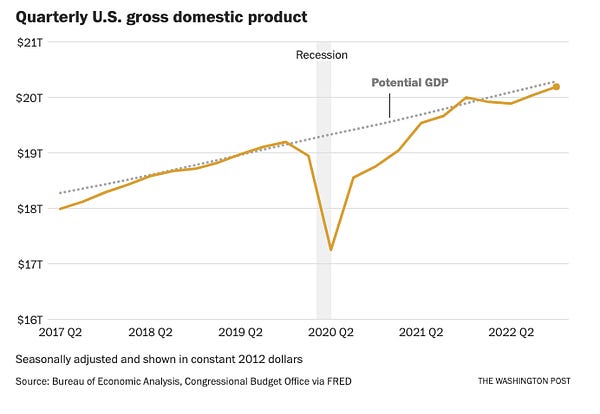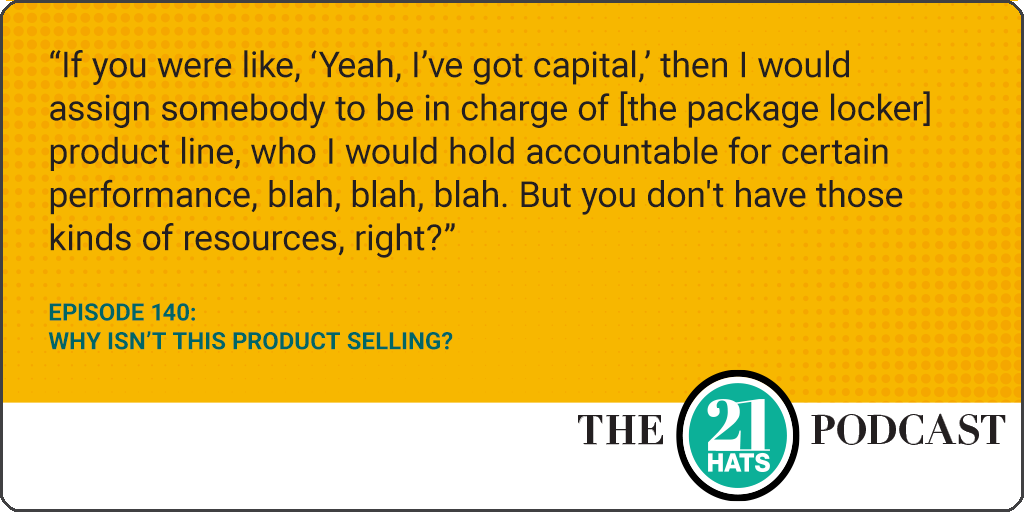Candace Nelson Goes From Cupcakes to Pizza
Is the market already tapped out? Or is the popularity of pizza proof of Nelson’s concept?
Good Morning!
Here are today’s highlights:
Usage-based pricing could be the next big thing.
A Google competitor offers his perspective on Google’s market dominance.
You might not know it if you just read the headlines about layoffs and inflation, but the U.S. economy has returned to its pre-pandemic trajectory.
There’s a business in Ohio that still makes washboards.
BUSINESS MODELS
Will subscription pricing be replaced by usage-based pricing? “When the Great Recession of 2008 hit, it proved to be a real opportunity for the tech industry to push a new business model: Instead of paying once for boxed software, companies like Salesforce, NetSuite, and even Google got their customers acclimated to getting billed as a monthly or annual subscription. Now, a decade and a half later, the subscription model is the hallmark of the cloud-computing era. Incumbents like Microsoft and Adobe and startups like Zoom all got on the bandwagon, making subscriptions the default way that many companies and consumers alike use software. With another global recession looming, another change to the software business model is on the horizon, industry insiders say. Instead of charging one time for the software, or a monthly subscription, a new breed of tech companies is pushing so-called usage-based pricing, also known as consumption pricing.”
“‘The best companies are saying, We want to have a mix of models that really accommodates all our different customers,' said Tien Tzuo, the CEO of the subscription-billing-management company Zuora. ‘Different customers might want different things as well.’”
“As the name suggests, the usage-based model sees customers only billed for what they use — no more, and no less. It's not exactly new: Cloud platforms like Amazon Web Services bill for the use of their cloud-hosted servers by the minute, and new-generation data companies like Snowflake charge for the data stashed on their platforms.”
“Experts predict the flexibility of this billing model will prove irresistible to customers, who are under pressure to stretch their dollars to the limit. That, in turn, will push companies large and small to at least explore the concept.” READ MORE
MARKETING
A Google competitor offers his perspective on the Justice Department’s lawsuit: “Late last year, the CEO of Google, Sundar Pichai, was asked pointedly by Kara Swisher where he sees competition in his business. Sundar named only two companies: TikTok and The Trade Desk. As the founder and CEO of The Trade Desk, I was quite surprised then. I still am now. Because he may have inadvertently made the government’s point as it prepared its antitrust lawsuit that dropped Tuesday. I often say that I compete with something like the 37th-highest priority at Google. And in that one area, The Trade Desk is a fierce and successful competitor.”
“At The Trade Desk, we help the biggest brands in the world buy ads online — banner ads, ads on podcasts, digital out-of-home ads, mobile ads, and especially connected TV ads. We help them use data to figure out which ads to buy, at what price, in millions of online ad auctions that take place every second.”
“Because we don’t own any media content or sites (destinations like YouTube), or a search engine (like Google.com or the much smaller, not-so-dominant Bing), we can objectively buy the ads that have the most value to any given brand. We always set up our system and incentives to do the best thing for the brand.”
“As the DOJ lawsuit points out, Google, on the other hand, makes money on all sides of the advertising transaction. In many cases, Google is even buying from Google on behalf of brands.” READ MORE
STARTUPS
Candace Nelson has moved from cupcakes to pizza: “Nelson, who along with her husband, Charles, created the successful Sprinkles cupcake empire after plunking down $200,000 to open its first LA location in 2005, is now taking on another eatery niche that, on paper, would seem to be tapped out. Don't tell that to Nelson, who is growing her new Pizzana restaurant brand at a healthy clip, backed by business partner and actor Chris O'Donnell. From its single restaurant that opened in 2017 in Brentwood, California, Pizzana now has three West Coast locations and its first eatery in Dallas, with more stores being targeted in Texas. ‘Pizza is one of the world's beloved foods, it's centuries old, and yes, people might say it's an overcrowded market,’ Nelson told AZ Inno. ‘But because people love it so much, it also gives you proof of concept. So if you execute well and differentiate yourself, you stand a good chance.’”
“Pizzana's slice of the pizza market focuses on the traditional Neopolitan pizza, which is known for its almost soupy center if cooked in the traditional Italian style and eaten with a fork and knife. The trick for Nelson's Italian-born chef Daniel Uditi was to create a hardier crust that Americans could pick up with their hands that still had the texture of the traditional Napolitano.”
“‘For our first year we didn't even offer takeout. I mean, who does a pizza restaurant with no takeout? We wanted to create the out-of-the-oven experience out of the box, so now for takeout we sell the pizza 75 percent cooked, then you bake it at home.’"
“Just as she was able to create a buzz for the Sprinkles brand through cable TV shows such as ‘Sugar Rush’ and ‘Cupcake Wars,’ Nelson is following the same formula for Pizzana as executive producer of a new pizza-focused program, ‘Best in Dough,’ airing on Hulu.” READ MORE
THE ECONOMY
The U.S. economy has returned to its pre-pandemic trajectory:


INTERNATIONAL
A British bicycle entrepreneur says Brexit red tape has eliminated 25 percent of his company’s revenue: “Cycloc, which has made a name for its distinctive indoor bicycle storage and accessories and includes Stella McCartney, Jonathan Ross and cycling star Mark Cavendish among its customers, says the EU represented 50 percent of its business before Brexit left it nursing a 25 percent decline in overall sales. ‘It is very disappointing. I am a naturally optimistic person, but in a sense it is very difficult to be positive,’ said the company’s founder and designer, Andrew Lang, in his studio in east London.”
“‘One of the things that is quite disappointing about this whole process is that from the outset, we made an active decision to manufacture in the UK. We’ve remained faithful to that and it feels as though the UK government hasn’t necessarily helped us.’”
“Cycloc’s products have been a British small business success story with its striking wall hangers popular with owners of expensive wheels who want to store them safely inside. They are used by some of the world’s leading cycle brands including Pinarello, whose bikes can sell for as much as £15,000.”
“By the time Brexit came along, business was flying with 10,000 units sold in the EU each year and annual [revenue] hitting £450,000. But once new rules came into force in January 2021 after the end of the transition period, business started to slow, especially after Amazon stopped fulfilling orders for individual EU customers buying from Britain.”
“Its experience is not unique and highlights the continuing damage Brexit is causing small exporters who cannot easily absorb the new administrative burden as easily as big businesses.” READ MORE
PROFILE
The Columbus Washboard Co. was founded before washing machines were invented: “As America’s last washboard-maker, the company controls the market, holding a monopoly with a steely grip and so far clean of antitrust scrutiny. Four employees churn out roughly 11,000 washboards a year in the basement of a former G.C. Murphy discount variety store. A popular pail-size model sells for $27.49. ‘The market is small, but if we can make enough to keep in business, we really want to keep the business going,’ said Larry Gerstner, one of the company’s four co-owners. Sales jumped 57 percent in 2020 over the prior year, the company said, goosed by pandemic fears of societal collapse and limited laundry service. ‘There were groups of people that were panicking,’ said Mr. Gerstner.”
“Columbus Washboard sold more than a million boards a year in its 1940s heyday. That was when wood-and-corrugated-steel boards were used for scrubbing clothing and linens by hand in a washtub of soap and water.”
“Today, about 40 percent of company sales go to bluegrass and folk musicians who use the boards as percussion instruments.”
“Columbus Washboard has a retail store in downtown Logan. On display are custom washboards with names of bands printed on them. One board was made for the Reverend Peyton’s Big Damn Band. Another read: Dolly Parton’s Smoky Mountain Adventures Dinner & Show.” READ MORE
THE 21 HATS PODCAST
This week, Shawn Busse, Liz Picarazzi, and Sarah Segal talk about when it’s time to give up on a product. For Liz, the problem product is her package locker, which is designed to defeat porch pirates but hasn’t really taken off—especially considering how widespread the concern is. Could the glitter-bomb guy be the answer to Liz’s marketing challenge? Or is it time for her to back off? Plus: In the age of Zoom and remote workers, what have the owners figured out about running effective meetings? And if you're pricing a range of services in a proposal, do you price your offering a la carte? Do you always charge the same prices? And is there a way to ease a client into a monthly retainer?
You can subscribe to the 21 Hats Podcast wherever you get podcasts.
Thanks for reading, everyone. — Loren




